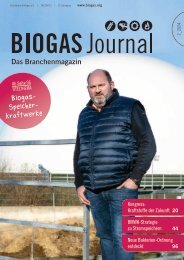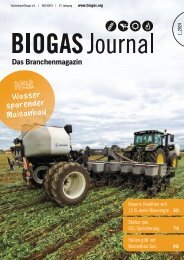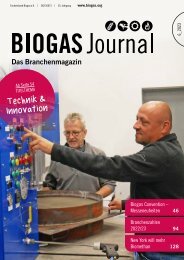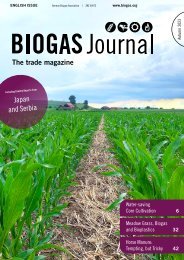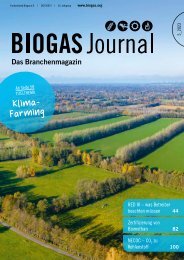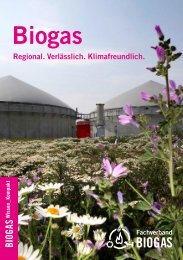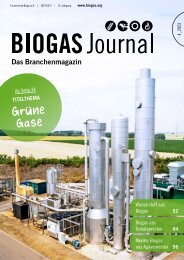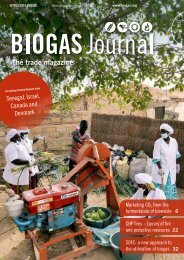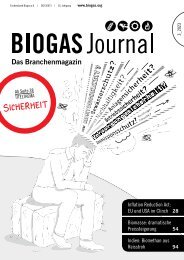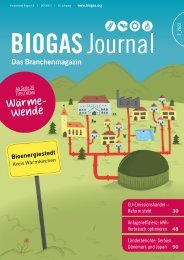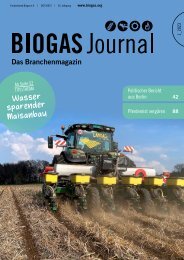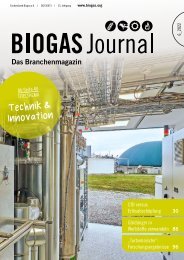Spring 2021 EN
The German Biogas Association presents its English spring 2021 issue of the BIOGAS journal.
The German Biogas Association presents its English spring 2021 issue of the BIOGAS journal.
Create successful ePaper yourself
Turn your PDF publications into a flip-book with our unique Google optimized e-Paper software.
Triple Lifetime and<br />
Easiest Maintenance<br />
Biogas Journal | <strong>Spring</strong>_<strong>2021</strong> English Issue<br />
soil horizon.“There is no formation of vapor<br />
bubbles, so there is obviously not enough<br />
calcium carbonate,” Dreymann states. She<br />
advises the biogas producer Rave to do liming<br />
in the spring and to work the field with a<br />
grass rejuvenator (a kind of harrow) before<br />
the first cut – it will gently slit open the soil<br />
so that air can get in.”<br />
Dr. Dreymann and the farmers speak at eye<br />
level. Her aim is not to discuss the topic in<br />
a monolog, but rather to find constructive<br />
solutions to the dilemma that crop yields<br />
have significantly declined at so many arable<br />
farms in recent years. Maize harvests of<br />
50 tons of fresh matter per hectare are now<br />
a thing of the past in a lot of areas. Many<br />
of the farmers at Dreymann’s practical soil<br />
seminar agree, some of them even mention<br />
up to 20 percent less harvest yields. It<br />
shows that something is going wrong.<br />
The climate change reveals<br />
management errors<br />
“Success in the field ultimately always<br />
depends on the method of cultivation,”<br />
Dreymann notes unmistakable. “The climate<br />
change and extreme weather conditions<br />
in recent years have exacerbated or<br />
confirmed this fact.” But this does not<br />
mean that there are no strategic solutions<br />
to these growing challenges. Quite the contrary.<br />
But Dreymann also said that farmers<br />
have to rethink the way they are treating the<br />
soil and that they have to realize that plants<br />
Uwe Schmidt in<br />
his own laboratory<br />
with fermentation<br />
specimens. <br />
and the soil form a close symbiosis which<br />
must be observed.<br />
For that purpose, what they knew in the<br />
past and what is still generally being circulated<br />
by the chambers of agriculture is<br />
no longer adequate. Classical soil analyses<br />
with mere NPK values do not provide the<br />
answers to important questions. Knowing<br />
more about the soil, about research on<br />
humic substances and about soil microbiology<br />
therefore requires a new transfer of<br />
the knowledge which Dreymann actively<br />
mediates.<br />
Humification plays a key role here, but it<br />
will not work if the nutrients in the soil fall<br />
out of balance. The high phosphate levels<br />
on many farms, for example, prevent the<br />
build-up of humus. According to Dreymann,<br />
if fermented manure is used appropriately,<br />
it could contribute to humification<br />
which has a high level of binding capacity<br />
for nitrogen.<br />
Promoting bacteria that fix<br />
nitrogen in the air<br />
Soil experts assume that about 2,500 kilograms<br />
of nitrogen fixation per hectare are<br />
required to increase humus in the soil by<br />
one percent. Dreymann knows that this<br />
cannot be done merely by fertilizing, but<br />
rather through the fixation of free nitrogen<br />
from the air by micro-organisms that also<br />
live around the roots of non-leguminous<br />
matter.<br />
Promoting the activity of the micro-organisms<br />
with more diversity and greater root<br />
penetration with sugar-containing root exudates<br />
is the prerequisite to binding<br />
xLC® Unit Complements FSIP® Concept<br />
The xLC® stator adjustment unit increases<br />
pump life threefold: In case of wear<br />
in the rotor-stator system the effciency<br />
of the pump is simply restored by<br />
readjusting the preload between the<br />
conveyor elements.<br />
If the service is due, this can be done<br />
thanks to the FSIP® concept quickly and<br />
easily in half of the usual time. This is the<br />
most service-friendly progressing cavity<br />
pump ever.<br />
NEMO® progressing cavity pump with xLC® unit<br />
25<br />
NETZSCH Pumpen & Systeme GmbH<br />
Tel.: +49 8638 63-0<br />
info.nps@netzsch.com<br />
www.netzsch.com







